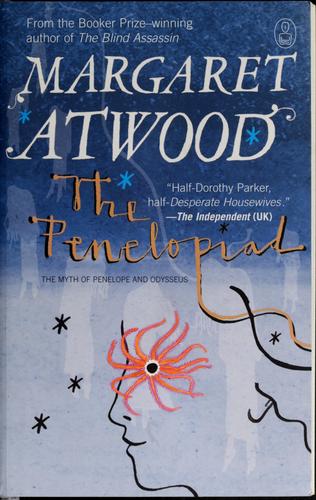Stephanie Jane a publié une critique de The Penelopiad (Canons) par Margaret Atwood
Loved Penelope's sense of humour
4 étoiles
I saw AJ Sterkel's review of The Penelopiad on her blog Read All The Things - ajsterkel.blogspot.co.uk/2018/01/review-penelopiad-margaret-atwood.html - back in January 2018 and thought I might enjoy the book, so was then delighted to spot this reissue on NetGalley a few weeks later. I've had a copy of Homer's The Odyssey sitting on my bookshelf for at least a year now awaiting reading. I don't think I've ever actually read the whole book, although I know the gist of several of Odysseus' adventures, and I admit being put off by its 300-odd epic-poem-in-small-print pages. The Penelopiad's relative brevity was far more enticing!
Atwood focusses on what Penelope might have done and felt during the years Odysseus was away firstly at war and then 'lost' on his famous odyssey home, and has Penelope tell us her side of the story from the afterlife where she is still surrounded by many …
I saw AJ Sterkel's review of The Penelopiad on her blog Read All The Things - ajsterkel.blogspot.co.uk/2018/01/review-penelopiad-margaret-atwood.html - back in January 2018 and thought I might enjoy the book, so was then delighted to spot this reissue on NetGalley a few weeks later. I've had a copy of Homer's The Odyssey sitting on my bookshelf for at least a year now awaiting reading. I don't think I've ever actually read the whole book, although I know the gist of several of Odysseus' adventures, and I admit being put off by its 300-odd epic-poem-in-small-print pages. The Penelopiad's relative brevity was far more enticing!
Atwood focusses on what Penelope might have done and felt during the years Odysseus was away firstly at war and then 'lost' on his famous odyssey home, and has Penelope tell us her side of the story from the afterlife where she is still surrounded by many of the people she knew in life. Of one of her Suitors who still hangs around she says: "The man was a pest when he was alive and a pest he remains." Penelope's sense of humour frequently chimed exactly with mine so I appreciated her sarcasm and wry observations. For many years she is effectively a woman abandoned and emotionally alone so, while appearing strong to the outside world, privately she does indulge in an awful lot of weeping - one of the perils of a Naiad mother apparently. Too much water. Penelope is doomed to live in a state of limbo repeatedly hearing rumours of Odysseus' wanderings and minstrel songs of his adventures while never learning when or even if he will return home. I loved the dry interpretations: "Odysseus was the guest of a goddess on an enchanted isle, said some; she had turned his men into pigs - not a hard job in my view - ... no, said others, it was just an expensive whorehouse and he was sponging off the madam." I wasn't so enamoured of the Greek chorus of maids who burst into poetry or song every so often. I understood this inclusion as it is reflective of the original Greek sagas and a good way to advance the plot by several years in a few verses, but it didn't have the humour of the prose chapters. The maids themselves are perhaps the most hard done by, realistically so, in this Odyssey retelling. Abused and ill treated by the horde of Suitors, they are then the ones to face ultimate punishment at the hands of Odysseus and his now-adult son. Atwood researched a variety of sources for The Penelopiad and her interpretations of the maids' gruesome end was very interesting to me. Instead of taking the patriarchal tale at face value, she looks at scant clues remaining to offer a different understanding of their, and Penelope's, true roles. It's an idea I would like to see explored more fully.
Overall, I enjoyed much about The Penelopiad. It did feel a bit too much of an Odyssey summary in places and I think a longer historical novel from Penelope's viewpoint might have been more satisfying, but I liked how Atwood envisaged her and her world. I will now (eventually) go into reading The Odyssey itself from an angle other than the one Homer probably intended

